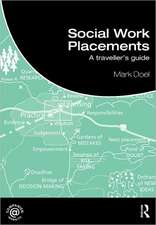An Introduction to Using Theory in Social Work Practice
Autor James A. Forteen Limba Engleză Paperback – 7 ian 2014
- The first section provides a practical foundation for beginning to use theory in your social work practice.
- Section two looks at how you can translate and integrate fourteen theories commonly found in social work across each phase of the planned change process. The theories discussed are: behavioural, interpretive anthropology, psychodynamic, evolutionary biology, cognitive, symbolic interactionism, strengths, social constructionism exchange economics, role, ecological, critical, feminist, and systems theory.
- The final section addresses some key issues for real life social work practice, including common barriers to using theory in practice, the potential for multi-professional communication and theory-sharing, and developing an integrative theoretical model for your own personal practice.
| Toate formatele și edițiile | Preț | Express |
|---|---|---|
| Paperback (1) | 487.10 lei 43-57 zile | |
| Taylor & Francis – 7 ian 2014 | 487.10 lei 43-57 zile | |
| Hardback (1) | 1110.74 lei 43-57 zile | |
| Taylor & Francis – 17 ian 2014 | 1110.74 lei 43-57 zile |
Preț: 487.10 lei
Nou
Puncte Express: 731
Preț estimativ în valută:
93.23€ • 96.08$ • 78.71£
93.23€ • 96.08$ • 78.71£
Carte tipărită la comandă
Livrare economică 03-17 martie
Preluare comenzi: 021 569.72.76
Specificații
ISBN-13: 9780415726719
ISBN-10: 0415726719
Pagini: 264
Ilustrații: 14 black & white tables, 11 black & white line drawings
Dimensiuni: 156 x 234 x 15 mm
Greutate: 0.41 kg
Ediția:1
Editura: Taylor & Francis
Colecția Routledge
Locul publicării:Oxford, United Kingdom
ISBN-10: 0415726719
Pagini: 264
Ilustrații: 14 black & white tables, 11 black & white line drawings
Dimensiuni: 156 x 234 x 15 mm
Greutate: 0.41 kg
Ediția:1
Editura: Taylor & Francis
Colecția Routledge
Locul publicării:Oxford, United Kingdom
Public țintă
Postgraduate and UndergraduateCuprins
Foreword Preface Section 1: Multi-Theoretical Social Work: Basics 1. Use Theories for Professional Purposes 2. Identify Your Theoretical Orientation 3. Cultivate an Orientation Affirming Theoretical Pluralism 4. Use Theories to Guide Helping Processes in Six Ways 5. Use a Metatheory to Guide Selection of Theoretical Languages for Helping Section 2: Multi-Theoretical Social Work and The Planned Change Process 6. Translate Theories to Guide the Engagement Process 7. Translate Theories to Guide the Information Gathering Process 8. Translate Theories to Guide Informational Question Formation 9. Translate Theories to Guide the Assessment Formulation Process 10. Translate Theories to Guide the Goal Setting Process 11. Translate Theories to Guide the Specification of Change Theory and Logic Model 12. Translate Theories to Guide the Identification, Selection, and Implementation of Intervention Strategies 13. Translate Theories to Guide the Evaluation Process 14. Translate Theories to Guide the Ending Process Section 3: Multi-Theoretical Social Work Across the Career 15. Identify and Remove Barriers to Multiple Theory Use Across the Career 16. Participate in Multi-theory Reflecting Teams 17. Choose and Implement an Approach to Integrate Theoretical Languages 18. Build an Integrative Multi-Theory Personal Practice Model Section 4: Conclusion 19. Coda: Translation and Translators for Multi-Theoretical Social Work
Notă biografică
James A. Forte is Professor of Social Work at Salisbury University, Maryland, USA.
Recenzii
‘The puzzle pieces fit just right with these texts. They can be effective for the everyday practitioner who wants to enhance and evaluate his or her own practice. They are similarly effective for budding undergrad students who have been told they should join social work because they are good at helping others. Yet, I found the book was just right for those who love theorizing and grapple with the pedagogical quandary of helping students think about how they think and what goes into authoring their own ending. The texts use illustrations, tables, grids, and sequential knowledge grids allowing individuals to use them for their own gain. This simple concept helps the practitioner or graduate student spring to page 60 and the undergraduate student use it as a dictionary approach to learning concepts versus simply reading page 1 to page 220. These books are like sweet victory where you feel you have scored. This is the best we have done in theory and theory education to date. Forte hits the homerun and we celebrate.’ – The New Social Worker
'[T]he author provides useful...“learning activities and lessons” at the end of each chapter.[T]his book provides a useful framework for teaching and learning about aspects of theorising that are transparent
and potentially open to critical reflection. The framework provided is valid as an approach to making meaning of complex life situations and applying that understanding to social work practice in Australia.'
Deborah Hart, University of Newcastle, Australia, Australian Social Work,
'[T]he author provides useful...“learning activities and lessons” at the end of each chapter.[T]his book provides a useful framework for teaching and learning about aspects of theorising that are transparent
and potentially open to critical reflection. The framework provided is valid as an approach to making meaning of complex life situations and applying that understanding to social work practice in Australia.'
Deborah Hart, University of Newcastle, Australia, Australian Social Work,
Descriere
This text equips the reader to use fourteen key social work theories to guide each phase of the planned change process, from engagement through to evaluation. It illustrates the value of applying theory to practice in a variety of social work roles, across diverse fields and facing assorted challenges.
















